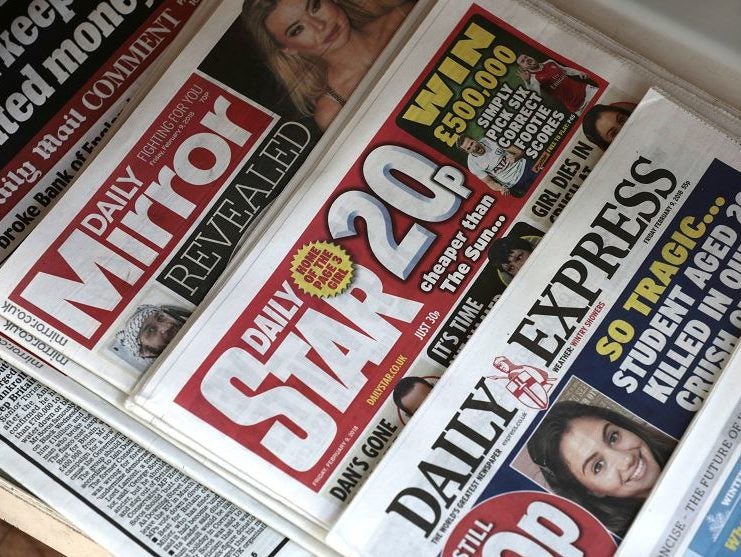
Reach has opened a voluntary redundancy round for its journalists in an attempt to cut costs.
However the National Union of Journalists warned the move could leave “unacceptable burdens on remaining staff”.
Group editor-in-chief Lloyd Embley and chief digital publisher David Higgerson told Reach staff in an email on Tuesday that the voluntary redundancy programme for editorial staff was being opened in part due to “challenging” market conditions.
The deadline for formal applications for voluntary redundancy will be at the end of August, with staff taking up the offer likely to leave Reach by the end of September.
The move will also include a short-term freeze on all hiring “in most areas” at the company.
Embley and Higgerson told staff: “As you know, we’re continuing to adapt our business to the changes in the market. Building a successful and sustainable long-term future for our business and brilliant brands will mean changing the shape of our business; investing in some areas and restructuring in others.
“You’ll also be very aware of the market conditions, which are increasingly challenging and make operational efficiency even more important.
“We’re passionate about our talented editorial colleagues and the work you do, so we want to be honest, upfront and fair as we take the business forward.
“As part of a programme to make cost savings across Reach, we’re going to be running a voluntary redundancy programme and have decided to open this up to editorial colleagues today.”
The NUJ called on Reach to detail how many staff it expects to lose in the voluntary redundancy round.
Reach, which publishes the Mirror, Express and Star national newsbrands as well as more than 100 local titles, is currently in a pay dispute with the NUJ over a proposed 3%, or £750 minimum, pay increase.
The union is set to ballot its members for strike action as it hopes for a pay increase closer to the current rate of inflation, which currently sits at over 9%.
NUJ Reach national coordinator Chris Morley said: “It is disappointing that the company is looking to make widespread redundancies having trumpeted 12 months ago how success meant it was able to recruit hundreds of extra digital journalists.
“The stop-go nature of journalistic employment just underlines how uncertain its prospects are both to those currently in it and those looking to enter it. As an industry, everything that can be done to make it a secure and attractive place to work – especially addressing endemic poor pay – must be done or the constant talent drain will continue to the detriment of all.
“We have asked for immediate information on the numbers of jobs that Reach is seeking to discard and where from, and how it proposes to safely organise workloads so that the impact of those leaving is properly considered and calibrated.
“We are aware that a number of jobs have already been cut in recent weeks from both national and regional operations. The union was additionally informed yesterday that a recruitment freeze has now been adopted too.
“We are seeking consultation on how this is managed to avoid unacceptable burdens on remaining staff and how the company can mitigate the consequences of any redundancy.”
One anonymous Reach employee said that they were now worried about the risk of compulsory redundancies in future and added that the increasingly low pay and overwork in Reach had meant he and several colleagues were rethinking working in the journalism industry altogether.
“Last year Reach made £146m, and then now all of a sudden they have turned round and said they’re offering voluntary redundancy,” they went on. “It pisses me off [that Reach says they’re financially struggling]. Their revenue has decreased ever so slightly but they’re still heavily in profit.”
In 2021, Reach operating profit was up 9.2% on an adjusted basis to £146.1m and its pre-tax profit was up 9.3% to £143.5m. Reach chief executive Jim Mullen saw his 2020-2021 remuneration increase by 743% on the year prior to over £4m.
However revenue in the first four months of 2022 was 0.9% lower than in the same period last year, while digital revenue growth slowed to 9.3% from 25% in 2021 due to the war in Ukraine reducing average yields on digital advertising. Print revenue fell by 4.2%.
A Reach spokesperson told Press Gazette: “As part of our ongoing transformation, we continue to adapt to changes in the market by restructuring in some areas and investing in others.
“With the added pressure of current macroeconomic pressures on the business, we are now seeking to make these changes through voluntary redundancies in some teams.
“It is essential that we continue to deliver our strategy, in order to protect the long-term health of our news brands and we continue to work closely with our teams to achieve this goal.
“We are also pausing recruitment in most areas, with key exceptions, but expect this to be a short-term measure.”
Picture: Reuters / Simon Dawson
Email pged@pressgazette.co.uk to point out mistakes, provide story tips or send in a letter for publication on our "Letters Page" blog
